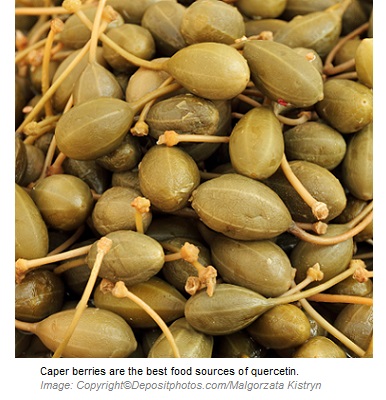Quercetin is a flavonoid that has antioxidant, anti-inflammatory, anti-cancer, and  anti-histaminic activities. It is also considered a phytoestrogen.
anti-histaminic activities. It is also considered a phytoestrogen.
Natural Sources:
The richest source of quercetin is caper berries. Other sources are onions, dill, kale, buckwheat, cranberry, watercress, black plums, apples, sweet potatoes, sea buckthorn, chokeberry, and prickly pear.
Benefits of Quercetin:
The conditions that may benefit from quercetin are:
- Prostatitis (non-bacterial).
- Allergies.
- Asthma.
- Diabetes type II (quercetin has an anti-diabetic effect by enhancing insulin production).
- Hay fever.
- HIV/AIDS (quercetin demonstrates activity against HIV).
- Hepatitis.
- Metabolic syndrome.
- Fibromyalgia.
- Gout.
- Hypertension.
- Eye disorders: cataracts and retinopathy.
- Varicose veins.
- Depression (not on medications).
- Parkinson`s disease (not on medications).
- Edema and water retention.
- It may improve athletic endurance.
Dosage and Interactions:
Quercetin is usually taken 1000 – 1500 mg per day. It has a synergistic effect with vitamin C and bromelain. Quercetin is contraindicated in people who take the antibiotics fluoroquinolones and the chemotherapeutic agent paclitaxel. It may also alter the metabolism of serotonin and melatonin by inhibiting the enzyme monoamine oxidase (MAO), which is responsible for breaking them down. People with depression and Parkinson’s disease who take medications should exercise caution when taking quercetin.

